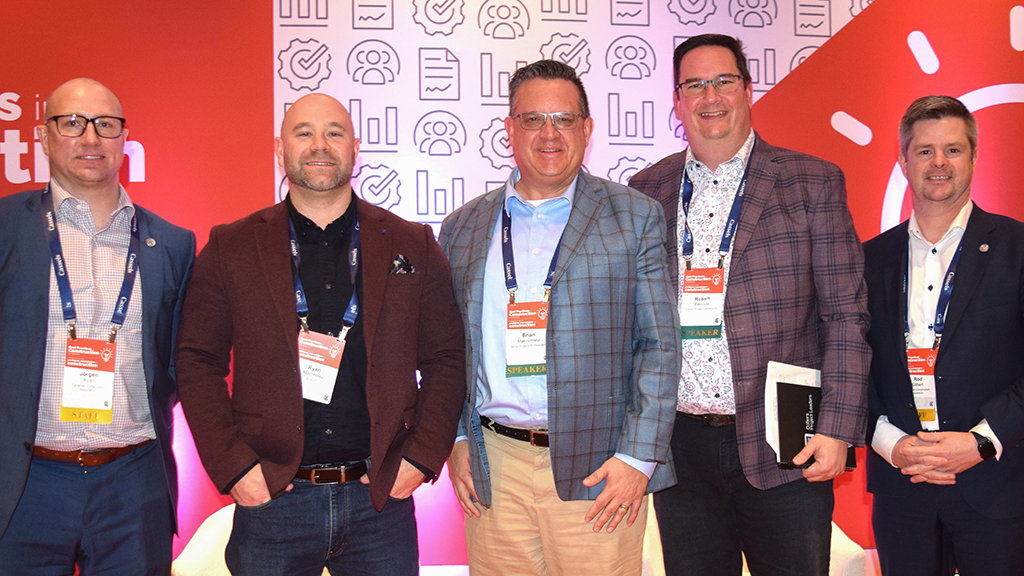Economic stagnation, trade threats and weak project demand across multiple sectors are not the only concerns for Canada's construction companies.
Delegates attending a project manager panel discussion in Toronto recently heard that owners and contractors in the industry are facing a number of growing challenges, including higher costs, more complex projects and a talent market that leaves strained project teams regularly at risk of losing key members through poaching.
Project delivery consultant Brian Maksymetz told delegates that successful contractors are those who find ways to keep their teams intact, well-trained, engaged, productive and loyal to their employer of choice.
He spoke at the inaugural Best Practices in Construction Symposium hosted by the Canadian Construction Association late last month. The event was chaired by Jorgen Kvist, CCA's Director of Industry Practices, and the project management session was themed “From Blueprint to Reality: Project Management Mastery.”
CCA President Rodrigue Gilbert commented: “At a time when the entire future is uncertain, the industry is always ready to get involved. And I think bringing all these real practitioners together… bringing solutions in real time, that was the idea.”
“There is a shortage of workers in engineering companies. There is a shortage of workers in construction companies,” Maksymetz said in an interview. “When you're in a heated market like Vancouver and Toronto, people are crossing the street to demand a 10 per cent wage increase.
“I'm focused on what employers are doing to become employers of choice again. What's old is new again, because that's what we always talked about 30 years ago.”
In addition to Maksymetz, collaborative delivery portfolio manager for water in Canada at Jacobs Consultancy, the project manager panel included Robert Balicsak, national director of higher education at Colliers Project Leaders, and EllisDon construction manager Ryan Martineau.
Best practices for team building
Maksymetz, Balicsak and Martineau offered a range of insights into team building and collaboration:
- Balicsak described a large design-build project that was already well underway when COVID-19 struck; The team faced new challenges. “We brought everyone together. And it was probably one of our most successful projects that I've ever done, in a time that I've never experienced in my life.
“We're still hanging with that team. We completed that project. It was a huge success. If you can get through a project and build a team, you'll have a successful project.”
- Martineau spoke about creating a culture of collaboration. “It's people and planning. … It's not just top-down, it's bottom-up driven.”
“Collaboration is the path to resilience. If you work well together, not only internally but also externally… Designing, building, financing, maintaining – these tasks require intense collaboration. There is a lot of risk for many individual parties, but if you create a culture of collaboration from the start and don't deviate from it, stand firm, it will be a successful project.”
- Maksymetz discussed the internal benefits of the collaboration. “In today's collaborative environment, everyone enjoys work more. They can work with the contractor, they can see how the work is being constructed… So you have a higher level of job satisfaction, plus jobs run better, engagement is higher, productivity increases, people work together to de-risk a project and solve problems.”
- Balicsak on open discussions: “Collaboration is not cooperation. The team must be able to challenge each other. Some people think they are working together, but they are just cooperating, and that does not contribute to the good of what we want to achieve.”
- Maksymetz on employee training: “Thirty years ago, when I started my career, the training budget was $1,000 per person per year. Thirty years later, companies still have a training budget of $1,000 per person per year. The best in the industry spend $15,000 per person per year on training. Their project results show it.”
- Martineau on dealing with conflict: “Conflict is an opportunity to build trust with someone and strengthen a relationship…You can open your mind to a different perspective on a problem.
“I can't tell you how many times I've disagreed with someone even though we really wanted to say the same thing.
“Be curious…when you truly understand each other’s position, you can work toward a common goal.”
